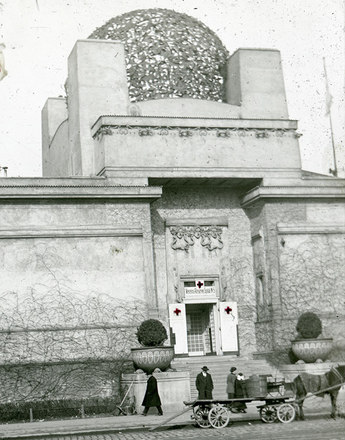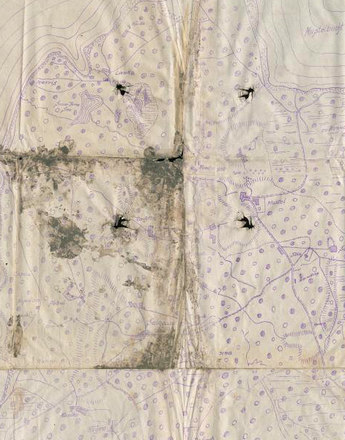War Advice from the Beehive: Maya the Bee as a Soldiers’ Bestseller
In 1976, when Die Biene Maja [Maya the Bee] flew onto the television screen as a cartoon character and Karel Gott contributed the title song that would later become a pop hit, Waldemar Bonsels’s most famous character was making her second triumphant sweep across the German-speaking world. The fact that Bonsels’s book was considered a ‘classic’ on the Front during the First World War is largely unknown today.
In 1912, Bonsels, a moderately successful Munich-based bohemian, published the children’s book Die Biene Maja und ihre Abenteuer [The Adventures of Maya the Bee], which became a bestseller during the course of the First World War and had sold 90,000 copies by 1918, bringing its author considerable wealth. The children’s book – as surprising as it may seem from today’s perspective – was, in its field edition, a firm favourite amongst German soldiers.
Maya the Bee mixes description of nature with fairytale, combining accurate and made-up biological characteristics. Maya has a tutor who teaches her the fundamental virtues of a bee, including being ‘polite and pleasant’ to insects – with two exceptions. When dealing with ‘the strongest and most evil’ historical enemies, the hornets, and the ‘useless thieving people without a homeland or faith’, the wasps, it is permissible to use the sting. Armed with a code of conduct and a clear concept of friend and foe, Maya leaves her home beehive, meets the friendly rose chafer beetle, whom she teaches not to speak with his mouth full, and the dung beetle, who falls unhappily in love with the cricket, and learns that it is unwise to fall for other species. She ends up trapped in the web of Thekla the spider, and is freed by her altruistic friend, the dung beetle. She meets the daddy longlegs who has to sacrifice a leg in order to survive. At the romantic pinnacle of the story, Maya sees a human couple: ‘Now I’ve seen the most wonderful thing [...] that I will ever set eyes on. Now I know that people are at their most beautiful when they care about one another.’ At the end, Maya is held captive by the hornets. There, she overhears their plan to attack her kind. She is able to escape and warn her tribe. Bonsels’s final chapter, ‘Die Schlacht der Bienen und Hornissen’ [The Battle of the Bees and Hornets] abandons biological realism altogether, and turns into an ideological fight. Although queen bees have no leadership role in nature, Bonsels’s Helene the Eighth exhibits traits of Kaiser Wilhelm II. She reacts harshly but fairly, and as commander-in-chief, she encourages her loyal retinue with the motto: ‘In the name of eternal justice and in the name of the Queen, defend the Kingdom!’
The battle ends with many deaths on both sides, and a young bee officer dies. ‘His valiant soldier’s death struck into our hearts the great blessedness of being willing to give up one’s life‘. Maya also shows her Christian ability to ‘love thy enemy’ when she creeps up to a dying hornet officer in order to comfort him with water and honey. The bees triumph, while Maya has the greatest honour bestowed upon her by the Queen and is made adviser on affairs of state.
In his work, Bonsels leaves behind a glorification of the bee state, which he depicts as a nationalist, martial, imperial monarchy with overtones of social Darwinism and racism, in keeping with prevailing currents of the Wilhelmine era.
Bonsels’s questionable role during the National Socialist era earned him a publication ban after 1945. He died in 1952; of his literary oeuvre, only Maya the Bee is still remembered.
Translation: Aimee Linekar
Bonsels, Waldemar: Die Biene Maja und ihre Abenteuer. Unter: http://www.gutenberg.org/ebooks/21021 (21.06.2014)
Daumer, Karl: Die Biene Maja aus biowissenschaftlicher Sicht, in: Hanuschek, Sven (Hg.): Waldemar Bonsels. Karrierestrategien eines Erfolgsschriftstellers, Wiesbaden 2012, 57-66
Hermes, Stefan: Zur Konstruktion kultureller Grenzen in Waldemar Bonsels’ Die Biene Maja (1912) und Indienfahrt (1916), in: Zeitschrift für Interkulturelle Germanistik 3 (2012), H. 1, 77-98
Weiß, Harald: Waldemar Bonsels’ literarischer Beitrag zum Ersten Weltkrieg, in: Claudia Glunz,Thomas F. Schneider (Hg.): Literarische Verarbeitungen des Krieges vom 17. bis zum 20. Jahrhundert, 47-60
Quotes:
Bonsels, Waldemar: Die Biene Maja und ihre Abenteuer. Unter: http://www.gutenberg.org/ebooks/21021 (21.06.2014) (Translation)





